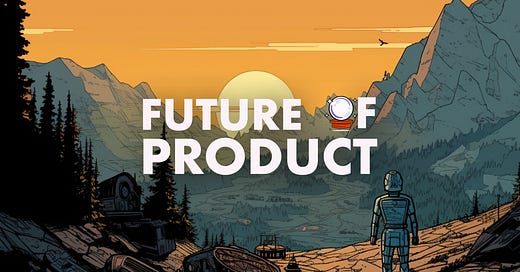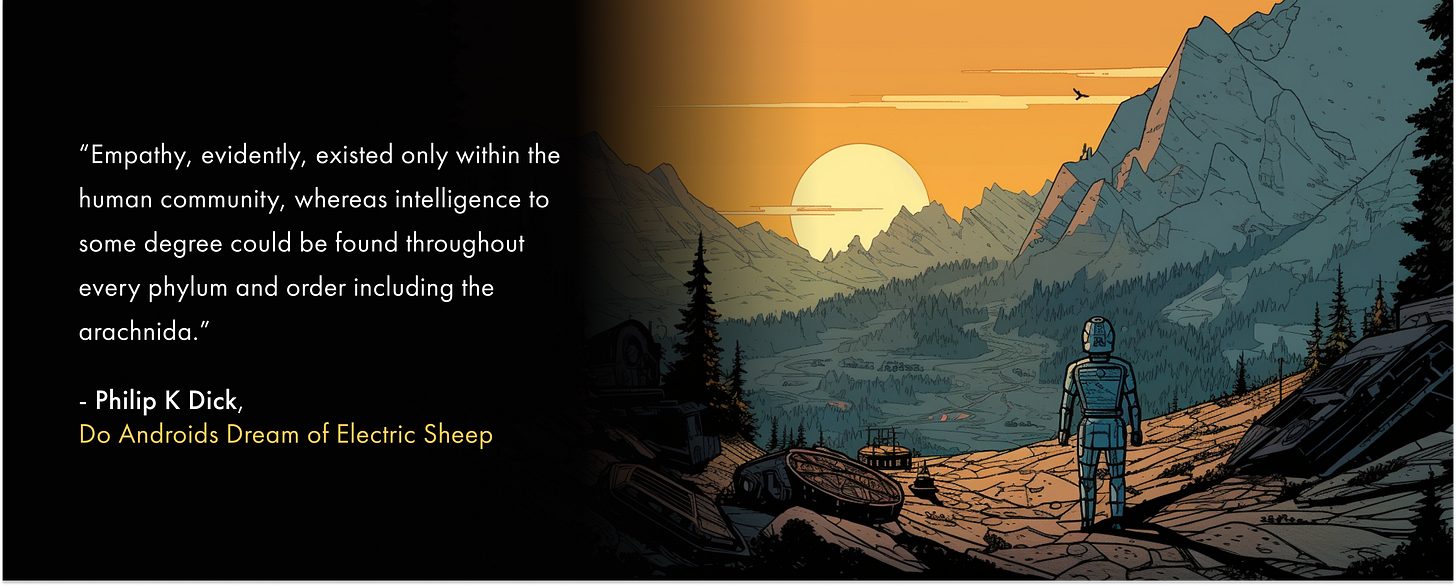Can AI make us better humans?
“Empathy, evidently, existed only within the human community” - Philip K. Dick, Do Androids Dream of Electric Sheep
If you’re not a subscriber, here’s what you missed this month:
My first ever podcast: Want better retention? Double down on what your customers really want | Steven Cohn (Founder @ Winware)
AI brand messaging frameworks and more... with Trent Lapinski of Openbrand
Subscribe to get access to these posts, and every post.
TL;DR
Can AI help us rediscover our humanity and increase our empathy?
Discover 3 top AI tools that are quick to set up and instantly enhance your efficiency.
AI news: Supreme Court case implications, US-India AI partnership, and the US’s plans to crackdown on harmful AI products.
IFYKYK by now, the fun stuff’s at the end (caveat - this time with one less fun thing than normal bc Sam Altman… you’ll see)
Embracing AI to rediscover our humanity
Everywhere you look, there’s someone with an extreme opinion on AI. Either it’s a technological miracle handed to us by the gods, or it’s a pandora’s box that’ll inevitably lead to our species’ downfall. Through writing this newsletter, I’ve attempted to strike a balanced viewpoint on the subject while staying pragmatic. From my perspective, AI is here to stay, thus, anyone who wants to build great products will inevitably be able to do so more efficiently with AI, or will be beaten out by someone else who does.
One of the coolest things I’ve had the opportunity to do throughout this process is to sit down and talk with the people that are leading the charge on applied AI to get their opinions on how it can incrementally improve our lives and those of our users today. As fun as it is to think about the implications of hypotheticals like artificial general intelligence, I think that’s where the real value lies. In the words of Steven Cohn (founder @ Winware) during my podcast interview with him this week (click here to listen to the full thing):
“I think a lot of people are scared of AI, [but] I think that it's going to open up humans to use more of what makes us unique and dynamic.”
I fully agree with Steven’s sentiments here, and they got me thinking about something... is it possible that leveraging AI to automate the small, annoying tasks that we and our users have to complete on a daily basis could actually give us the mental bandwidth to make better decisions and approach human situations with more empathy and patience? Could we use AI to make us better humans?
According to C. Daryl Cameron for Greater Good Magazine out of Cal Berkeley:
“Compassion is a powerful moral emotion—it moves us to care for the suffering of others, and enables us to live cooperatively with one another. Yet we live in a society of constant connection, in which the successes and sorrows of others are brought to us instantly through phones, computers, TV, radio, and newspapers. With that increased connection comes the risk of becoming overwhelmed or overburdened by our emotions. Fearing exhaustion, we turn off our compassion.”
The above article puts forward that people don’t actually have a defined limit to the amount of empathy or compassion that they can feel, but rather, that “the amount of compassion is dependent upon expected costs”. In other words, in a situation in which the expected cost of feeling empathy is large, participants in studies experience less of the emotion, whereas in less costly circumstances, participants felt more empathy. This isn’t the way that I’ve thought about empathy in the past. I had always assumed that in general, people have a certain amount of emotional bandwidth, and that empathetic responses largely depend upon the ratio of spent to available empathy.
This new perspective on empathy, combined with the breakneck speed of recent advancements in AI opens up a world of possibilities. If we can utilize AI to handle mundane tasks, cut down on decision fatigue & eliminate the barriers that prevent us from being our most empathetic selves by decreasing the perceived cost, we might just have more energy than we expect to dedicate to empathy and compassion in our human interactions.
And so far, the research behind this theory bears out. For instance, a recent University of Washington study developed an AI system to suggest more empathetic responses for users on a peer-support mental health community. The results showed that AI-assisted communication led to more effective empathy expression compared to traditional training, with the best outcomes arising from human-AI collaboration:
“Our randomized trial demonstrated that peer supporters with access to feedback expressed between 20% and 40% more empathy than supporters in the control group that did not have access to such feedback. Among our participants, 69% of peer supporters reported that they feel more confident at writing supportive responses after this study, indicating increased self-efficacy.”
While this study was specifically designed to bolster participants’ empathy, it’s quite exciting to think about how useful a tool AI could be for evoking empathy and other socially beneficial feelings in our day-to-day lives in mass-application.
Furthermore, bringing this same approach to the products we build with an eye for decreasing the perceived cost of completing the “jobs to be done” that are most important to our customers will likewise improve their overall experience, and their perception of our products. Also from my podcast with Steven:
“I think a lot of people are scared of AI, [but] I think that it's going to open up humans to use more of their what makes us unique and dynamic.”
By embracing AI and the unique benefits it can bring, we can make space for the innate human qualities that enable us to connect with others and create meaningful experiences.
As product builders and business leaders, it's essential to recognize the potential of AI in transforming the way we interact with our users. By leveraging AI to automate repetitive tasks and analyze data more effectively, we can focus on understanding our users on a deeper level and design products that cater to their emotional needs. In doing so, we not only create better products but also contribute to a more empathetic and compassionate society.
In conclusion, AI doesn't have to be a threat to our humanity. Instead, it can serve as a catalyst for enhancing our human qualities, like empathy and compassion, and help us build better products and experiences for our users.
Some of my favorite pieces on the subject of how AI can help us be more empathetic:
Can Human-AI Collaboration Enhance Empathy? by Dr. Marlynn Wei M.D., J.D., for Psychology Today
Q&A: How AI can help people be more empathetic about mental health by Sarah McQuate for UW News
How to Increase Your Compassion Bandwidth by C. Daryl Cameron for Greater Good Magazine
3 AI-powered tools to turbocharge your efficiency, today
🏆 Winware
The product - Are you struggling with churn? Winware's AI is a powerful tool that analyzes your product usage data and pinpoints the experiences that contribute positively to achieving customer goals. The best part? No need to involve your data team.
The use case - Winware is perfect for product managers looking to optimize their product's user experience, drive engagement, and boost customer satisfaction. By identifying key factors that lead to customer success, product teams can streamline their focus, make data-driven decisions, and enhance their product's overall performance without overloading their data team.
Listen to my interview with the founder here
🦦 Otter AI
The product - Otter is an AI meeting assistant that goes beyond just recording audio. It writes notes, automatically captures slides, and generates comprehensive summaries for an all-in-one meeting solution.
The use case - I mention Otter this week because they were the platform I used to transcribe this week’s podcast (linked here)! I’ve wrestled with a TON of different transcription services in the past, and so far Otter has been by far the best at taking a raw MP3 and turning it into a usable transcript with assigned speakers.
✅ Ayanza
The product - there are a lot of AI-powered project management tools popping up right now. This one stood out due to its promise of “AI as your new teammate” and its substantial free tier (you’ll find I love an overpowered free tier more than anything).
The use case - for product managers struggling with staying on top of multiple projects, Ayanza could be a game-changer. Its AI-powered features help ensure that tasks are organized efficiently, deadlines are met, and team communication is smooth. By automating these processes, product managers can focus on strategy and innovation while being confident that their team is working in harmony.
Meet your product monitoring co-pilot
Introducing PlayerZero co-pilot, a groundbreaking evolution in product monitoring made possible by recent AI technology advancements. With this tool, you and your team can effortlessly track customer experiences and pinpoint the root causes of unfavorable outcomes in real time, all without needing any technical expertise. It's the most convenient method for product professionals to address complex questions within their products and promptly provide actionable solutions to their engineers without ever needing to understand or interpret a line of code.
Co-pilot communicates in a language you understand - simply ask it how your users are doing, and in return, you'll receive a comprehensive view of every customer interaction from all perspectives, including events, identities, and both the front-end and back-end issues responsible for those experiences. By integrating powerful connectors like Datadog, Sentry, Mixpanel, and Amplitude, PlayerZero stands as the sole platform capable of connecting all the pieces to present a holistic representation of every customer's experience with your product. Simply connect an API key, and co-pilot will handle the rest.
Learn more about PlayerZero co-pilot today and get your first month free!
Chronicles of the circuit circus
Landmark Supreme Court case could have 'far reaching implications' for artificial intelligence, experts say - Nikolas Lanum for Fox News. The big pull quote:
“Marcus Fernandez, an attorney and co-owner of KFB Law, said the outcome of the case could have "far-reaching implications" for tech companies, noting it remains to be seen whether the decision will establish new legal protections for content or if it will open up more avenues for lawsuits against tech companies.
[...]
"The decision is likely to be a landmark one, as it will help define what kind of legal liability companies can expect when they use algorithms to target their users with recommendations, as well as what kind of content and recommendations are protected. In addition to this, it will also set precedent for how courts deal with AI-generated content," he said.”
WEIRD AI: Understanding what nations include in their artificial intelligence plans - James S. Denford, Gregory S. Dawson, and Kevin C. Desouza for Brookings. The big pull quote:
“...several key developments have occurred in national AI governance and international collaborations. First, one of our key recommendations was that the U.S. and India create a partnership to work together on a joint national AI initiative. Our argument was as follows: “…India produces far more STEM graduates than the U.S., and the U.S. invests far more in technology infrastructure than India does. A U.S. -India partnership eclipses China in both dimensions and a successful partnership could allow the U.S. to quickly leapfrog China in all meaningful aspects of A.I.” In early 2023, U.S. President Biden announced a formal partnership with India to do exactly what we recommended to counter the growing threat of China and its AI supremacy.”
US officials seek to crack down on harmful AI products - Matt O’Brien for The Seattle Times. The big pull quote:
““We all know that in moments of technological disruption, established players and incumbents may be tempted to crush, absorb or otherwise unlawfully restrain new entrants in order to maintain their dominance,” Khan said at a virtual press event Tuesday. “And we already can see these risks. A handful of powerful firms today control the necessary raw materials, not only the vast stores of data, but also the cloud services and computing power that startups and other businesses rely on to develop and deploy AI products.””
AI distractions
😶 OpenAI’s CEO once bragged about his hoard of guns and gas masks
Apparently Sam Altman is a bit of a doomsday prepper. That’s comforting. The two scenarios he thinks could lead to the end times? A lab-modified super contagious virus and, “AI that attacks us”... huh.
🖌️ New Photoshop filters that use cloud based AI are quite funny
This one’s a bit old but I go back to it every time I need a good laugh - like, for instance, when I found out that the founder of OpenAI thinks AI will kill us all...
🔥 They turned Lenny into a chatbot!
Somebody in my audience pls do this for me... I want to be an android and I want to be one right now.
Signoff
Thanks so much for joining me on another edition of Future of Product! I hope you've been enjoying our new twice-a-week release cadence. If you haven't already, be sure to check out the first episode of the Future of Product Podcast, where I had an insightful conversation with Steven Cohn, founder and CEO of the AI customer experience platform, Winware.ai. You can access the episode here.
Get ready for next week's podcast, where I'll be sitting down with my colleague and the Head of Product at PlayerZero, Matt Kasner. We'll be diving into a hot topic: how NOT to be replaced by AI, as well as discussing the best methods to embrace AI and accomplish more with less in a product role. Matt’s a super interesting guy, the best PM I’ve met, and a good friend of mine - you won’t want to miss this one.
Keep innovating and I’ll see you next week!









